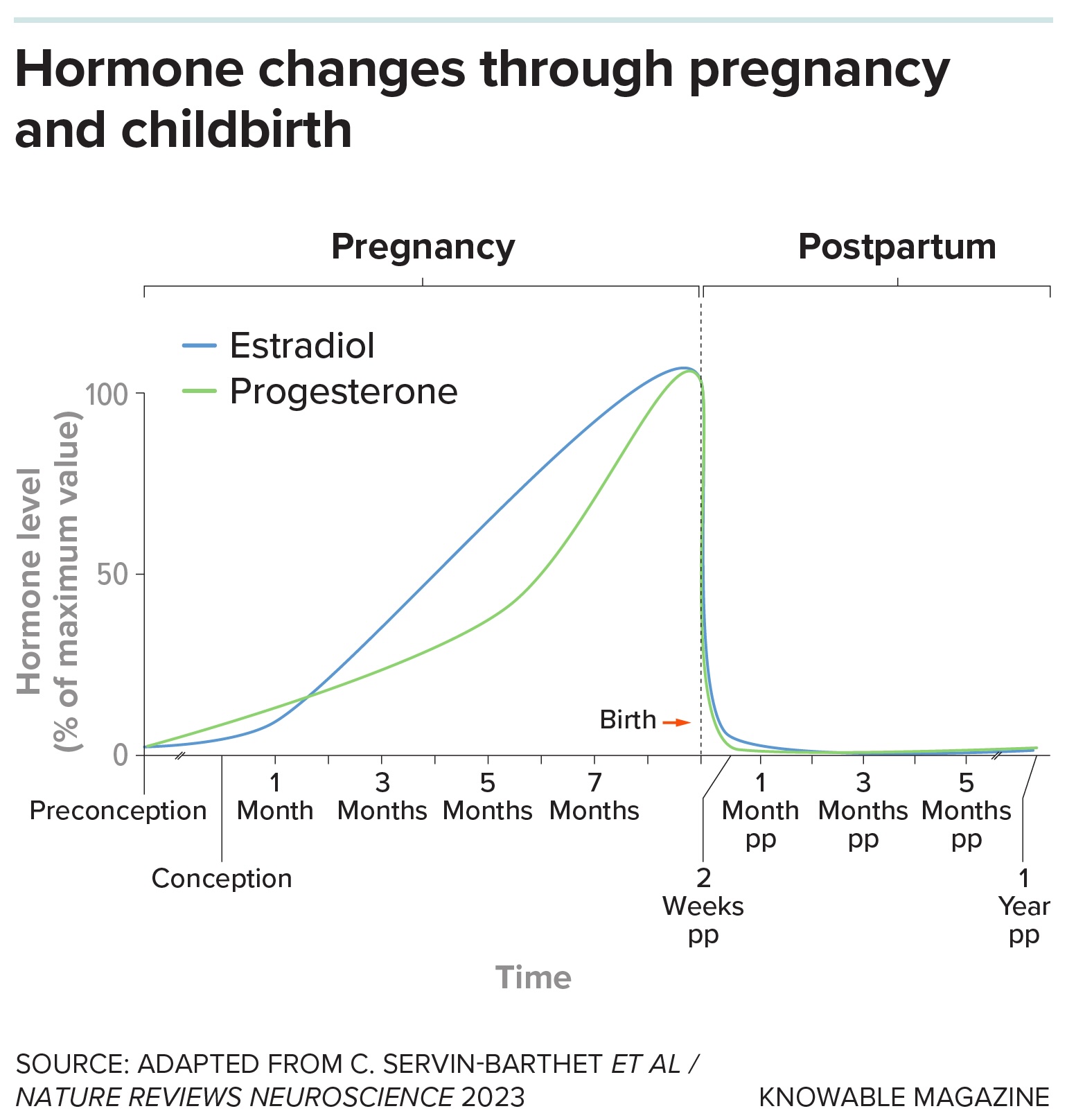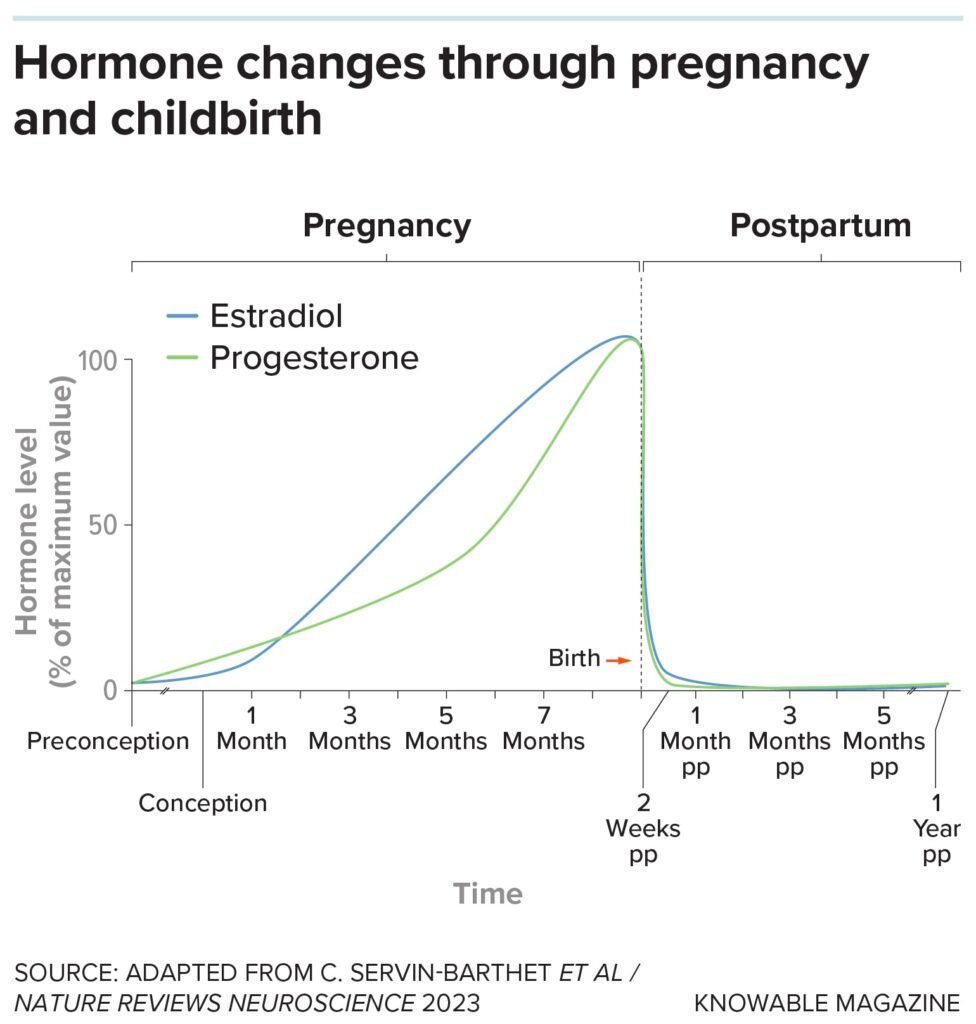Like many first-time mothers, Lisette Lopez-Rose thought childbirth would usher in a time of joy. Instead, she had panic attacks as she imagined that something bad was going to happen to her baby, and she felt weighed down by a sadness that wouldn’t lift. The San Francisco Bay Area mother knew her extreme emotions weren’t normal, but she was afraid to tell her obstetrician. What if they took her baby away?
At about six months postpartum, she discovered an online network of women with similar experiences and ultimately opened up to her primary care doctor. “About two months after I started medication, I started to feel like I was coming out of a deep hole and seeing light again,” she says. Today, Lopez-Rose works at Postpartum Support International, coordinating volunteers to help new mothers form online connections.
The first-ever drug for postpartum depression, containing a derivative of progesterone, received US Food and Drug Administration approval in 2019. That marked a new approach to the disorder. This winter, in another major advance, a San Diego-based startup company will launch a blood test that predicts a pregnant woman’s risk of postpartum depression with more than 80 percent accuracy.
The product, called myLuma, will be the first commercially available test to use biomarkers — molecules in the body, in this case the blood — to predict onset of a psychiatric disorder, much in the way that blood tests can detect signs of diseases like cancer and diabetes. Pregnant women who learn they are at risk for postpartum depression could take preventive steps such as taking antidepressants after childbirth or arranging for extra support.
A blood test could reduce the stigma that keeps many women from seeking help, says Jennifer Payne, a reproductive psychiatrist at the University of Virginia in Charlottesville and a lead investigator on the studies that led to the new test. She is a founder and member of the scientific advisory board for the company that makes myLuma, Dionysus Health.
“If we have a blood test, it brings psychiatry down to the level of biology, which I think your average person can understand as something that needs treatment and that isn’t just in somebody’s head,” she says.

Unpredictable effects of hormones
Payne was a fellow at the National Institute of Mental Health in 2001 when she became intrigued by postpartum depression as a window into the onset of mood disorders. That led her to a key question: Why does the sudden drop in hormones after childbirth greatly affect some women but not others? While it’s not uncommon for women to experience transient feelings of anxiety and sadness within days of giving birth, only in some does a deeper and more persistent depression take hold.

As Payne’s research evolved, she teamed up with Zachary Kaminsky, then a colleague at Johns Hopkins University, who studied the effects of estrogen on mouse brains. Kaminsky is an epigeneticist: He researches how small chemicals called methyl groups can attach to genes and affect how active they are. Environmental factors from pollution to nutrition can affect the extent of this reversible methylation.
By comparing female mice given high levels of estrogen to those without it, Kaminsky found that estrogen caused specific gene methylation patterns inside cells in the hippocampus, a part of the brain that helps control mood. Those findings suggested what to look for in blood samples Payne had collected from 51 women with a history of mood disorders. The women had been tracked throughout their pregnancies and afterward, with some developing postpartum depression within four weeks of childbirth.
Two estrogen-sensitive genes emerged from the research — HP1BP3 and TTC9B. More than 80 percent of the women who had postpartum depression showed a distinctive pattern of greater methylation on one gene and less methylation on the other. What’s more, the changes in the genes could be detected throughout each trimester of pregnancy, says Kaminsky, now at the University of Ottawa Institute of Mental Health Research at the Royal; he also is a cofounder of Dionysus. In other words, even early in pregnancy, Kaminsky says, “you can predict the women that are going to get postpartum depression.”
Kaminsky, Payne and collaborators repeatedly replicated those findings. As reported in a 2016 paper in Neuropharmacology, they found that through the methylation patterns of those genes, they could correctly predict more than 80 percent of the cases of postpartum depression in 240 pregnant women who had no history of psychiatric disorders. In another collaboration published in 2020 in Psychiatry Research, scientists at Johns Hopkins, Emory University and the University of California, Irvine, including Payne and Kaminsky, tested blood samples from 285 pregnant women and also confirmed the findings.
That epigenetic research forms the basis of the myLuma test, which also incorporates additional biomarkers that improve its accuracy, says Kaminsky. Beginning in January 2026, it is expected to become available at some doctors’ offices in three states: Florida, Texas and California. Though it isn’t yet FDA-approved, doctors are permitted to use such lab tests to help make clinical decisions.
Zeroing in on steroids
Not everyone with postpartum depression has these epigenetic changes, so Payne and other researchers continue to hunt for other biomarkers to understand how hormonal changes trigger postpartum depression. They are zeroing in, for example, on neuroactive steroids, which the body makes from molecules like progesterone in the brain and other tissues.
One of those metabolites, called allopregnanolone, has a calming effect — it affects a receptor in the brain called GABA-A, which is known to be involved in stress reduction. Allopregnanolone rises during pregnancy and drops swiftly after delivery. Another neuroactive steroid, pregnanolone, has similar properties. A third, isoallopregnanolone, tamps down the antidepressant effect of allopregnanolone, increasing feelings of stress.
In a study of 136 pregnant women published in 2025 in the journal Neuropsychopharmacology, women with an imbalance in pregnanolone and isoallopregnanolone during pregnancy were more likely to develop postpartum depression. Measuring the ratio of these chemicals in the blood could be another way to predict postpartum depression, says reproductive psychiatrist Lauren M. Osborne of Weill Cornell Medicine in New York City, who co-led the study with Payne.
Allopregnanolone, meanwhile, has already proved to be a valuable tool for treatment. A synthetic version called brexanolone was developed by Cambridge, Massachusetts-based Sage Therapeutics and FDA-approved in 2019 — the first drug approved specifically for postpartum depression. Originally provided via IV infusion, it has been replaced by an oral version, zuranolone, which was FDA-approved in 2023.
If we have a blood test, it brings psychiatry down to the level of biology, which I think your average person can understand as something that needs treatment and that isn’t just in somebody’s head.
Jennifer Payne, University of Virginia in Charlottesville
These are “transformative therapies” because they work rapidly, write the authors of a 2025 article in the Annual Review of Medicine. Women at high risk of postpartum depression might even benefit from proactively taking zuranolone, though that hasn’t yet been tested, says article coauthor Samantha Meltzer-Brody, a reproductive psychiatrist at the University of North Carolina who was an academic principal investigator in studies of brexanolone and an investigator in zuranolone trials.
The availability of a blood test, she adds, “opens up that entire line of questioning on how do you get ahead of it, so you don’t have to wait until someone starts suffering?”
There are other possible targets for a postpartum depression test. In a 2022 article in Molecular Psychiatry, Johns Hopkins neuroscientist Sarven Sabunciyan, with Osborne, Payne and Morgan Sherer, then an immunologist at Johns Hopkins, described a small study in which the types of RNA carried through blood in fatty bubbles were different in women who developed postpartum depression — both in pregnancy and afterwards. In particular, there was a decrease in kinds of RNA related to autophagy — the cleansing of debris from cells. Autophagy has been linked to other psychiatric disorders.
In another potential lead, Eynav Accortt, a clinical psychologist specializing in perinatal mental health at Cedars-Sinai Medical Center in Los Angeles, found a pattern of altered proteins in plasma samples of women who developed perinatal mood and anxiety disorders, a group of conditions that includes postpartum depression. This included proteins involved in neuron function and in inflammation, which is known to play a role in depression.
As researchers continue to explore these possibilities, Payne is leading a large clinical trial that will provide more detailed information on the predictive value of the myLuma test. For example, it will explore the rates of false positives (women who are identified as at-risk who do not develop postpartum depression) and false negatives (women who develop postpartum depression but weren’t identified by the test). That is a necessary step toward FDA approval, which could make the test available directly to pregnant women.
Lopez-Rose remembers how scared she felt in the months after her daughter was born. In those dark times, she quit her job, barely slept and was overwhelmed by negative thoughts. She had many self-doubts, but she now knows that reaching out for help was a sign that she was a good mother.
Today, her daughter is four — and thriving, as is Lopez-Rose. But a blood test, she says, would have warned her of what to look out for, “instead of it being so shocking when I was going through my depression.”
This article originally appeared in Knowable Magazine, a nonprofit publication dedicated to making scientific knowledge accessible to all. Sign up for Knowable Magazine’s newsletter.


